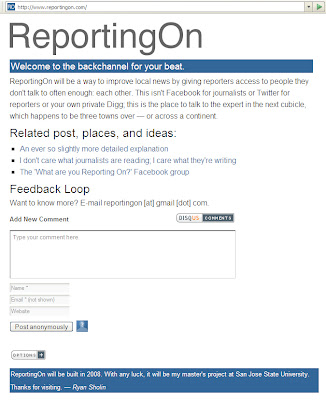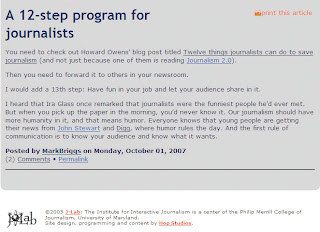Trying to be humble, I didn’t plan to post this link. But then I figured this was relevant site news since it’s my first time being linked from another journo-blogger…and it made my mother proud. Take a look:
Tag: Journalism
Reporting on the "ReportingOn" concept
I’ve been reading Ryan Sholin, who blogs about journalism, for a few weeks now. I always enjoy his posts, but I found one item on a list of New Year’s resolutions particularly interesting.
 The third resolution (“Graduate.”) includes creating a proposal for a Web site concept aimed at journalists, specifically beat writers, to discuss what they are reporting on; thus the name “ReportingOn.” To the right is a screenshot of the page, where anyone can submit feedback.
The third resolution (“Graduate.”) includes creating a proposal for a Web site concept aimed at journalists, specifically beat writers, to discuss what they are reporting on; thus the name “ReportingOn.” To the right is a screenshot of the page, where anyone can submit feedback.
I think this a great concept to help better connect journalists — and readers — to improve the flow of ideas. One concern on the Facebook group wall (which is like a test site of the idea), is being scooped. Ryan replies: “Keep it broad. You might be working on a story about alternative energy, but there’s no need to say which type or which company is building it. Imagine a site where one click shows you a list of everyone ‘reporting on’ alternative energy…”
I’m a competitive being, as most journalists are, but the purpose of our profession is to inform. If you don’t want to be scooped, don’t give away the scoop. We must continue to adapt how we do our job to better inform readers and this site would be a great way to help do so.
I can’t wait to see the final site and join.
“ReportingOn will be a way to improve local news by giving reporters access to people they don’t talk to often enough: each other. This isn’t Facebook for journalists or Twitter for reporters or your own private Digg; this is the place to talk to the expert in the next cubicle, which happens to be three towns over — or across a continent.” – ReportingOn.com
Related links:
Web site
Blog
Facebook group
Ryan’s posts regarding ReportingOn:
Resolutions » Invisible Inkling
(Jan. 1, 2008)
ReportingOn: An ever so slightly more detailed explanation » Invisible Inkling
(Oct. 24, 2007)
I don’t care what journalists are reading; I care what they’re writing » In atvisible Inkling
(Aug. 15, 2007)
Weigh in: Journalists and readers, would you participate? What are some pros and cons?
Update, Feb. 9 at 1:01 a.m.: Ryan posted an update with a mockup.
Talking dirty diapers
Today I finished reading Journalism 2.0: How to Survive and Thrive by Mark Briggs. I also began voraciously consuming his past blog posts. I’ve made it as far back as September 2007 as of now and, in the process, have opened many of the links provided.
I created a J-Lab user account and commented on multiple postings, but one post in particular spurred a longer thought. Here is my response to “A 12-step program for journalists,” from Oct. 1, 2007:
Mark, I agree. Journalism definitely needs better well-placed humor and humanity. Reporters and editors still need to take subjects seriously when warranted, but if news organizations want to attract younger audiences (a community to which I belong), they need to understand why people watch Jon Stewart. Many young adults are growingly cynical when it comes to the news and politics, so the Daily Show and the Colbert Report take an angle they can identify with and find entertaining. Those programs succeed with humor, sarcasm, parody, irreverence and such. They question authority and highlight absurdities. They remove the “filter.” In all, they are fulfilling a journalistic role, all the while providing an enjoyable watching experience for the viewer.
Many young adults are growingly cynical when it comes to the news and politics, so the Daily Show and the Colbert Report take an angle they can identify with and find entertaining. Those programs succeed with humor, sarcasm, parody, irreverence and such. They question authority and highlight absurdities. They remove the “filter.” In all, they are fulfilling a journalistic role, all the while providing an enjoyable watching experience for the viewer.
“Infotainment” is something we as journalists need to avoid, but that doesn’t mean news should be drier than a fresh diaper. Let’s not be afraid to soil ourselves from time to time, as long as we keep our reputations clean.
Please feel free to weigh in to the discussion by commenting below.
Sidebar: I’ve also been digging into Poynter‘s Web site and surfing for other journalism pages online. Basically, I’m trying to give myself a self-taught, Internet-based intersession course during winter break. Stay tuned…
Fair comment? Where do you draw the line with user opinions?
Online article comments are being talked about more and more, most recently in Miami Herald ombudsperson Edward Schumacher-Matos’ column in today’s Herald.
The topic was also discussed at the Florida Society of Newspaper Editors conference I attended a two weekends ago. Two of the sessions I attended focused part of their discourse on this issue: A writing for the Web session with The Herald‘s Martin Merzer and a session on ethics by Kelly McBride from Poynter.
Here are some articles to check out:
 When comments cross the line by Steve Meyers
When comments cross the line by Steve Meyers
 Looking for ways to tame poisonous words on Web by Edward Schumacher-Matos
Looking for ways to tame poisonous words on Web by Edward Schumacher-Matos
WANTED: Multimedia Editor
The Miami Hurricane student newspaper is looking to hire a multimedia editor, a paid position that would begin in the spring. This editor would oversee all aspects of multimedia for TheMiamiHurricane.com and work with staff members who are producing multimedia content.
Applicants should be skilled in capturing and editing audio and video. Experience with Final Cut Pro and the ability to to create slideshows with Flash are required.
It also important that candidates be able to be able to complete projects in a timely manner because of twice-weekly deadlines for the Monday and Thursday editions.
Please contact Greg Linch at editor@themiamihurricane.com to submit a resume and an electronic portfolio, as well arrange an interview.